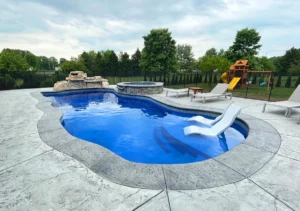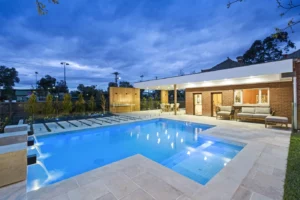The Ultimate Guide to Eco-Friendly Swimming Pool Installations in 2025
Swimming pools are a great way to enjoy sunny days and relax in your backyard. However, traditional pool installations often come with high environmental costs, from excessive water use to energy consumption. As we move into 2025, the need for more eco-friendly solutions has become essential. In this ultimate guide, we’ll show you how to plan a swimming pool installation that’s both energy-efficient and environmentally friendly. By integrating green technologies, sustainable materials, and water-saving solutions, you can create a pool that’s as kind to the planet as it is to your enjoyment.
Environmental Impact of Traditional Swimming Pools
Traditional swimming pool installations are known for their negative environmental impacts. Some of the most significant concerns include:
-
High Water Consumption:
Pools can consume thousands of gallons of water each year. Constant evaporation and the need for refills contribute to water waste, especially in areas facing drought conditions.
-
Energy Consumption:
Pool heaters, pumps, and filtration systems often use a lot of energy. Traditional systems require significant electricity to maintain optimal water temperature and cleanliness, which can contribute to higher carbon emissions.
-
Harmful Chemicals:
Chlorine and other pool chemicals are commonly used to maintain water clarity and hygiene. While effective, these chemicals can be harmful to local ecosystems when drained or spilled, polluting surrounding land and water sources.
Why This Problem Needs Immediate Attention
The environmental consequences of traditional swimming pool installations are becoming increasingly evident. Here are a few pressing reasons why it’s essential to transition to eco-friendly pool solutions:
-
Water Scarcity:
Many regions around the world are experiencing severe water shortages. Reducing water waste from pools can significantly impact local water conservation efforts.
-
Energy Costs:
With rising energy prices, homeowners are looking for ways to reduce utility bills. Pool systems that consume large amounts of energy are costly, both for the environment and for your wallet.
-
Health and Ecosystem Risks:
Pool chemicals, when improperly managed, can seep into the ground or waterways, harming wildlife and plant life. As we become more aware of environmental sustainability, opting for eco-friendly solutions is a key step in minimizing harm to our planet.
-
Consumer Demand:
In 2025, more homeowners are seeking sustainable living solutions. Eco-friendly swimming pools are not only good for the environment but also increase property value, making them a smart investment.
Eco-Friendly Swimming Pool Installation Practices for 2025
Thankfully, there are numerous ways to approach swimming pool installation that make it both sustainable and enjoyable.
Here are the top eco-friendly practices to consider when planning your pool installation in 2025:
1. Design Considerations
- Solar-Powered Heating: Solar pool heating systems are a fantastic way to reduce energy consumption. These systems use the sun’s energy to maintain the pool’s temperature, cutting down on electricity usage.
- Energy-Efficient Pool Pumps: Modern pool pumps are designed to use less energy while still keeping the water clean and circulating. Variable-speed pumps, in particular, are known for being energy-efficient and cost-effective.
- LED Pool Lighting: Traditional pool lights can consume a lot of energy. LED lighting uses far less energy and has a longer lifespan, making it an excellent eco-friendly option for pool lighting.
2. Sustainable Materials
- Recycled and Locally Sourced Materials: Consider using recycled glass tiles, natural stones, or locally sourced materials for pool construction. These options reduce transportation emissions and support sustainable industries.
- Alternative Pool Liners: Traditional vinyl pool liners can be replaced with eco-friendly options such as fiberglass or natural stone. These materials are more durable, meaning less maintenance and fewer replacements over time.
3. Water Conservation Techniques
- Pool Covers: Pool covers are an easy and effective way to reduce water loss from evaporation. By covering your pool when it’s not in use, you can prevent hundreds of gallons of water from evaporating into the air.
- Greywater Recycling Systems: Some eco-conscious pool owners are integrating greywater recycling systems to refill their pools. These systems collect water from sinks, showers, or laundry and use it to replenish pool water, significantly reducing reliance on fresh water.
4. Natural Swimming Pools:
A growing trend in eco-friendly swimming pools is the use of natural swimming pools (NSPs). Unlike traditional pools, NSPs don’t use chemicals like chlorine. Instead, they rely on plants and natural filtration systems to keep the water clean. These pools mimic natural swimming holes and offer a unique and sustainable swimming experience. Not only do they reduce chemical use, but they also create a harmonious environment for wildlife and local flora.
Inspiring Backyard Pool Ideas for Eco-Friendly Living
You can bring your backyard to life with eco-conscious designs using these creative Backyard Pool Ideas.
-
Compact Pool Designs:
Not every backyard needs a large pool. Smaller, more compact pool designs use fewer resources, less water, and less energy while still offering all the fun and relaxation you expect from a pool.
-
Native Plant Landscaping:
By incorporating native plants around your pool, you can minimize water usage and help support the local ecosystem. Native plants require less water and are naturally resistant to pests, reducing the need for chemical treatments.
-
Infinity Pools:
Infinity pools with water features that recycle and reuse water are becoming increasingly popular. This not only conserves water but also adds a luxurious, elegant look to your backyard.
Benefits of Choosing an Eco-Friendly Pool in 2025
Switching to an eco-friendly pool is an investment that pays off in both the short and long term. Here are some benefits to consider:
- Lower Long-Term Costs: Although the initial installation may be higher, the long-term savings on energy, water, and maintenance make eco-friendly pools a financially smart choice.
- Environmentally Conscious: By reducing your pool’s energy and water consumption, you’re actively contributing to a more sustainable future. Eco-friendly pools help preserve natural resources and lower your carbon footprint.
- Increased Property Value: As more homeowners prioritize sustainability, having an eco-friendly pool can increase the market value of your property. It’s an attractive feature for potential buyers who value green living.
- Less Maintenance: Eco-friendly pools typically require less maintenance than traditional pools, as they use more durable materials and sustainable systems that don’t need frequent repairs or chemical treatments.
Steps to Get Started with an Eco-Friendly Pool
If you’re ready to build your eco-friendly pool, here are some simple steps to follow:
- Research: Begin by researching sustainable pool installation companies that specialize in eco-friendly practices. Make sure they offer energy-efficient solutions and have experience with green building techniques.
- Plan Your Design: Work with a designer to incorporate energy-saving features, sustainable materials, and water conservation practices into your pool design.
- Install Green Technologies: During installation, choose options such as solar heating, LED lights, energy-efficient pumps, and pool covers to enhance the eco-friendliness of your pool.
- Ongoing Maintenance: Regularly maintain your pool’s filtration systems and check for any leaks. Keep up with landscaping to ensure your plants are water-efficient and sustainable.
Conclusion
As we move into 2025, the need for eco-friendly swimming pool installations has never been more urgent. By embracing sustainable technologies and practices, you can enjoy a beautiful and functional pool while also protecting the environment. Whether you’re considering solar heating, natural swimming pools, or water conservation techniques, the options are endless. Start your journey toward a greener pool today, and make your backyard a haven for both relaxation and sustainability.
Ready to create your dream eco-friendly swimming pool? Contact AI Signature Pool Solutions for expert swimming pool installation services today. Start building a sustainable pool for 2025!
FAQs
- How can I make my swimming pool more energy-efficient?
To make your pool more energy-efficient, consider using solar-powered pool heaters, energy-efficient pool pumps, and LED lighting. Also, use pool covers to reduce water evaporation and energy loss.
- Are natural swimming pools truly eco-friendly?
Yes, natural swimming pools use biological filtration systems and plants to clean the water without chemicals like chlorine, making them an excellent eco-friendly choice for homeowners.
- What are the benefits of using solar-powered pool heating?
Solar-powered pool heating reduces energy costs by using the sun’s energy to maintain your pool’s temperature, offering a renewable energy source that’s better for the environment and your wallet.
- How can I conserve water in my swimming pool?
You can conserve water by using pool covers to prevent evaporation, installing a greywater recycling system, and repairing leaks promptly to avoid unnecessary water loss.
- How much does an eco-friendly pool cost compared to a traditional pool?
While the initial cost of an eco-friendly pool may be higher due to sustainable materials and technologies, the long-term savings on energy, water, and maintenance make it a cost-effective investment.



